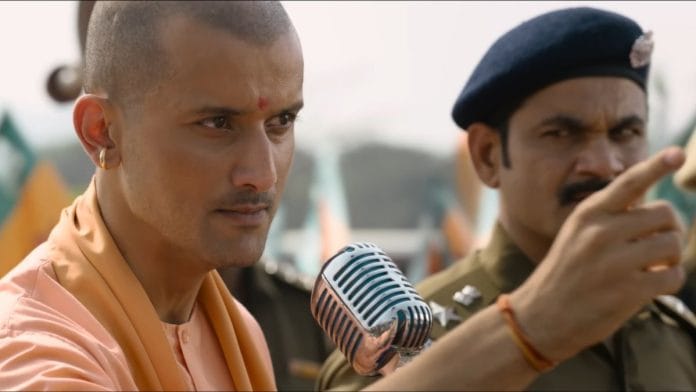New Delhi: Ravindra Gautam’s Ajey: The Untold Story of a Yogi is a reverential ode to Uttar Pradesh Chief Minister Yogi Adityanath. And his character never does anything remotely controversial.
The movie instead chooses to fictionalise accounts and shows Ajey aka Yogi Adityanath (Anant V Joshi) as a victim of vendetta politics. In one such scene, Ajey is arrested on the orders of then UP CM Mulayam Singh Yadav, whose administration is protecting a local mafia by the name Mushtaq Ahmed (Rajesh Khattar).
The film, produced by Ritu Mengi, is based on Shantanu Gupta’s The Monk Who Became Chief Minister: The Definitive Biography of Yogi Adityanath. The four-part book looks at the life and career of the chief minister from childhood to his tenure in 2017.
In 150 minutes, the film documents his journey from a young man who fights against local goons and for the dignity of women to a monk and finally the chief minister in 2017. It makes no mention of the Hindu Yuva Vahini, the Right-wing vigilante group infamous for its controversial campaigns. The book, however, mentions the controversial outfit, which was disbanded in 2022.
The non-politics of ‘Ajey’
In the film, Ajey has somewhat of a refrain: “I am not made for politics.” Yet, he plays one political masterstroke after the other. He also spouts one-liners such as “Hamesha bal ka nahi, akal ka bhi estamal karna parta hai (It is important to use brain over brawn),” before quickly changing his stance to ‘sometimes muscle/power is the only logical action’.
Inspired by Mahant Avaidyanath (Paresh Rawal), who only converses in philosophical sentences, Adityanath becomes a monk. The Mahant tells his protege to give up ‘me’ to work for ‘we’—the greater public good.
Played by Anant V Joshi of Kathal and Maamla Legal Hai fame, we get a sanitised, saintly version of the chief minister, whose politics include love jihad and bulldozers. While Joshi’s performance is commendable, his character is flatter than cardboard. In fact, it can be used to teach how not to write a character.
The bulldozer does appear, only as part of a sentence when Ajey tells his college principal that if he had money, he would have used force to destroy a wall where slurs against his female classmate were scribbled. Otherwise, any violence in the film is credited to Mushtaq, who leads a riot and even orders a hit on Adityanath after he addresses a political rally in Domariaganj.
But Adityanath uses secret service-level tactics to hoodwink the villain and arrive for the rally. He rides in the back of a car with a man pretending to be a tuberculosis patient, leaves a decoy in his place at the Gorakhpur math, and finally takes a boat—all because he very clearly isn’t interested in becoming a political leader.
The only two Muslim characters in the saffron landscape of the film are, in fact, stereotyped. A gun-wielding male criminal and a burqa-clad woman who needs Adityanath’s help against her neighbour.
Also read: Kanpur is the new Wasseypur in Anurag Kashyap’s Nishaanchi
A ‘real’ journalist
The film features a journalist Dhananjay (Dinesh Lal Yadav), who works for a local daily Amar Jagran, and does ‘fearless’ journalism. Dhananjay’s job is less of a journalist and more of a publicist, who follows Adityanath everywhere.
His fearless journalism includes taking photos of the Muslim rioter, and of Adityanath’s public service, and telling his editor that he wants to be a ‘real’ journalist. What’s more, he even helps Adityanath in his scheme of reaching Domariaganj by pretending to be his driver.
The film could have been a promising watch if it were not for the glaring omissions or comical creative choices. But it is difficult to separate it from the prominent political figure it is based on. Although Joshi nails his character, the triumphant background score that plays every time he solves a problem takes away from his gravitas. While the film is a much better take than a propaganda project like The Kashmir Files (2022) or The Kerala Story (2023), it does end up whitewashing a political figure. In fact, the filmmaking might actually make it difficult for audiences to separate fact, propaganda, and fiction.
The film’s selective screenplay by Dilip Jha and Priyank Dubey uses exactly those facts or real incidents that boost Adityanath’s image. By the time the film ends, you start wondering if you should blow a conch in honour of his holiness.
(Edited by Prasanna Bachchhav)






